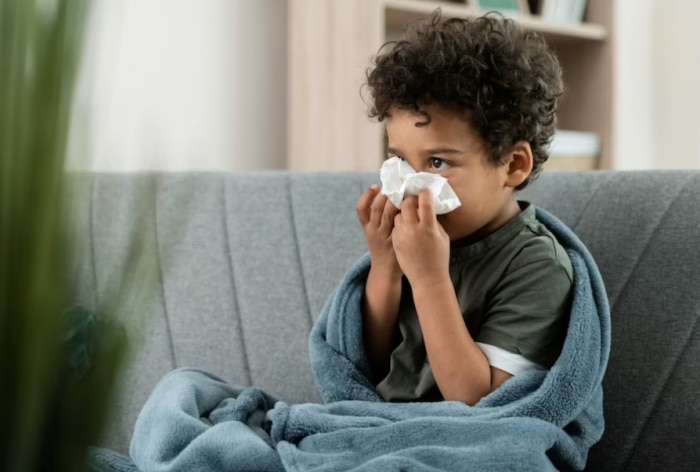With heavy rains lashing the cities, monsoon-related diseases have risen across the nation. Along with fungal infection, viral respiratory illness is also on a rise. Usually, children, senior citizens
With heavy rains lashing the cities, monsoon-related diseases have risen across the nation. Along with fungal infection, viral respiratory illness is also on a rise. Usually, children, senior citizens, pregnant women and people with existing comorbidities are most vulnerable. Respiratory Syncytial Virus Infection (RSV) is a giant germ problem, especially for little kids.
Speaking on how it affects children, Dr.Chandrasekhar Singha, Senior Consultant and Incharge Pediatric Critical Care, Madhukar Rainbow Children’s Hospital explained how this virus mostly affects babies, newborns, and toddlers because their breathing system is still developing. When RSV gets into their bodies, it affects their respiratory system, making it harder for them to take deep breaths and get enough oxygen. Children infected with RSV usually show symptoms within four to six days.
Respiratory Virus Infection: Symptoms, causes & Prevention
- Coughing and sneezing
- Fever
- Sore throat and swelling in the throat
- Breathing difficulties and weakness
- Respiratory distress, such as wheezing or a whistling sound while breathing
If a baby shows these symptoms, it is important to seek prompt medical attention in such cases as it can prove to be dangerous for babies or toddlers
Causes
- The RSV virus is spread through aerosols (droplets present in the air) and direct contact. It is usually spread by touching contaminated surfaces or objects and then touching the nose or mouth. RSV infection is a highly contagious virus and it can be spread easily in crowded places such as malls, schools, and daycare centers.
- RSV infection is more prevalent during weather changes, especially between the summer and monsoon seasons when respiratory problems are more common, making it important to be vigilant during this time.
- Babies who are born prematurely or who are weak from birth are at a higher risk of RSV infection. In severe cases, RSV infection can cause bronchiolitis, pneumonia, or other breathing problems that may need hospital treatment. For babies, especially those under six months old, RSV infection can be life-threatening.
Prevention
Preventing RSV infection in children is crucial to safeguard their health and well-being. Here are some preventive measures to reduce the risk of RSV transmission:
- Washing hands frequently: Parents should encourage their children to wash their hands regularly, which helps prevent the spread of RSV and other infections.
- Avoid Close Contact with Sick Individuals: Limit exposure to people who have cold-like symptoms or respiratory infections, especially during RSV season.
- Always clean the surface: Always disinfect frequently touched objects, such as toys, door handles and light switches, to prevent the spread of viruses.
- Cover Coughs and Sneezes: It is very important to teach children to cover their mouths while sneezing so that no one else gets caught in these diseases.
- Avoid going to crowded places: Avoid taking young children to crowded places during the RSV season, especially if they have a weakened immune system.
- Breastfeeding: Breastfeeding provides antibodies that can help protect infants from infections, including RS
- Vaccination: There is no dedicated vaccine for RSV, immunization against other preventable illnesses like influenza can potentially lower the chances of respiratory complications in children.
- Maintain a Healthy Environment: Ensure that children are in a clean and hygienic environment to minimize exposure to infectious agents.
This virus is a big concern for young children, especially for babies and little kids. Knowing the signs, risks, and ways to prevent it can keep children safe from serious infections and problems. Taking care of hygiene and avoiding places with germs can stop RSV from spreading.
Published Date: July 26, 2023 9:35 AM IST
–>
–>


